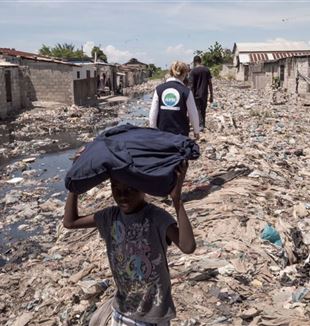
Avsi Tents: Good generates good in Haiti too
The fundraising campaign has been supporting the NGO's activities around the world for years, like in Haiti, as recounted by Jessica Granito, an AVSI worker on the since 2017.Jessica Granito started working in Haiti in 2017 as a civilian peace corps for the AVSI Foundation. Today she still works on the Caribbean island as the humanitarian coordinator of the NGO's projects in the country. In these six years, she has seen the island change so much. And not for the better.
"I have travelled the length and breadth of Haiti, although I am now 'settled' in Port-au-Prince, the capital, which is also the most complex area because it is in the hands of armed gangs. Despite this climate of instability, we still manage to move around even in the poorest communities, such as Cité Soleil and Martissant, precisely because we have been an established presence in the country since 1999. However, things are not easy. The world only remembers this island for the terrible earthquake of 2010, but there have been other earthquakes, hurricanes and epidemics in recent years, while poverty, violence and political instability are a daily occurrence. In 2018, massive demonstrations began, which continue to this day with barricades and clashes, which have plunged Haiti into total lack of control. People protest for many reasons. Cyclical fuel shortages mean that people are stranded: no electricity, no petrol. Ships often dock in Port-au-Prince but because the Haitian government does not have the money to pay, it remains unused. In other cases, the executive has raised the price of petrol a lot to be able to buy new fuel, but making it unaffordable for the population. Quite a short circuit. Added to this are the effects of the pandemic and war in Ukraine, which have worsened the already fragile international trade. In June 2021, the armed gangs that control Martissant (which is the district whose street is the only link with all the departments in the south of the island) started a war that has completely changed the geography of control of the different areas. Alliances have changed, there have been clashes, executions, kidnappings and heinous attacks against civilians, and moving between the capital and the suburbs has become very difficult. This has caused economic problems because the agricultural south, with people coming to sell their produce in the city, has remained isolated. The roads are unsafe, hospitals do not work, malnutrition is widespread. As if this were not enough, the Haitian president was killed in July 2021. Today, a premier is in office who is not constitutionally recognised by everyone and who is struggling to implement effective social policies, so much so that a UN intervention is planned in the coming months to try to at least restore security, since 80 per cent of the capital is in the hands of gangs.”
The picture is bleak, but Jessica is not disheartened. She is not, she says, because every day she sees the passion and dedication the local AVSI staff move with to help the most fragile people, the most vulnerable families. And often, they are people and families they know, with whom they have grown up and with whom they share suffering and hardship. The title chosen by the Tents Campaign 2023-2024, ‘We desire peace. Let's give it a face, ours’, provoked her a lot: what does it mean to build peace where everything seems to be inexorably crumbling? The answer lies in a few facts. One in particular.
Read also - If peace has a face
"I see people living in unjust conditions every day and this pains me. But I meet a very resilient people, capable of sharing what little they have. I was struck by the story of a 15-year-old girl who became pregnant after suffering repeated violence. Abandoned by her family, she lived on the streets but kept the baby. When officers found her, in southern Haiti, the baby was in a severe state of malnutrition because the young girl, although she loved him very much, did not know how to take care of him. After all, she was a child herself. We rushed him by helicopter to the capital and took care of him. He slowly recovered, and at the same time we put his mother in the distance support project, because she wanted to continue her studies, and we provided her with assistance and psychological support. She is not yet 'out of danger' in the sense that she is still a minor and our hope is that one day she will be able to find a job to support herself and the child. There is still a lot of work to be done, but she already experiences an incredible gratitude and desire for life. And she pours it out around her. This builds peace. If I had to talk about 'building peace' in general, I would not know what to say. We do not have the power to make poverty and injustice magically disappear. But looking at her I can say that it is possible: she knows the good she has received. Perhaps one day she will tell her child about it and this child will grow up knowing that he was wanted by his mother, that he is loved. This, perhaps, will in turn enable him to choose to be a good, honest, creative man. Good generates good. I believe that peace can only be born from here.”